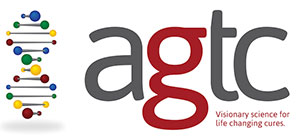#KnowYourGene: AGTC Working On Multiple IRD Treatments
Applied Genetic Technologies Corporation (AGTC), a clinical stage biotech company that focuses on rare inherited retinal diseases (IRDs), develops therapies that replace “broken” genes with normal functional genes – treatments that allow a patient’s own body to produce proteins to treat their disease.
As a headline touts from an AGTC website story: “Imagine That the Power to Beat Genetic Disease Lies Within Us.”
The work that companies such as AGTC undertake serves to underscore the importance of genetic testing in the treatment of rare inherited retinal diseases. This month, Sofia Sees Hope has launched a #KnowYourGene campaign in advance of International Rare Disease Day on Feb. 28.
A clinical diagnosis of a named disease is not enough to help find cures and treatments for these and other rare IRDs.
For meaningful and productive research to advance, patients need to take the most important step to help further research into correcting the mutated genes affecting their vision:
- Get a definitive genetic diagnosis of their eye condition with genetic testing. Talk to your doctor about ordering a test through one of several laboratories or contact Foundation Fighting Blindness (FFB) about free testing.
Genetic testing is key
AGTC (headquartered in Alachua, Fla., with offices in Cambridge, Mass.) strives to get the word out through their patient advocacy work headed by Jill Dolgin, Pharm.D. The company partners with Sofia Sees Hope (SSH), which helps fund FFB’s free genetic testing and genetic counseling program.
A priority for AGTC is to find and educate people with rare inherited retinal diseases and encourage them to get genetic testing. Patients with the same gene mutations studied by AGTC could potentially participate in one of their clinical trials.
The company also is collaborating with advocacy groups to inform individuals with the conditions for which AGTC is conducting clinical research, including:
- Achroma Corp. , an organization providing support and education to those affected individuals and families with Achromatopsia
- MomsForSight, which provides information to affected individuals and families with X-Linked Retinoschisis
- Foundation Fighting Blindness of US and Canada
AGTC also reaches people with rare inherited retinal diseases through online and print articles, social  media, medical publications, national vision conferences and their website.
media, medical publications, national vision conferences and their website.
What’s in the pipeline
The conditions for which treatments are under Phase 1 and Phase 2 clinical investigation include:
X-linked retinoschisis (XLRS) is the leading cause of macular degeneration in males. An inherited form of retinal degeneration affecting young males, patients affected by XLRS present with poor vision by school age. Visual acuity usually worsens during the teenage years and then can lead to serious complications such as vitreous hemorrhage or retinal detachment during adulthood.
Mutations in the RS1 gene cause early onset retinal disease. In animal models of XLRS, treatment with an AGTC gene-therapy candidate leads to long-term improvement in retinal function and preventing retinal cell degeneration. Based on preclinical proof-of-concept data, AGTC is conducting a clinical study to evaluate the safety and efficacy of an investigational gene therapy in patients with XLRS.
Achromatopsia causes visual acuity loss, extreme light sensitivity resulting in daytime blindness and reduced or complete loss of color distinction. About 75 percent of cases are associated with mutations in the CNGB3 and CNGA3 genes, also known as ACHM B3 and ACHM A3 genes, respectively. The company is currently evaluating a gene therapy in a Phase 1/ 2 trial for individuals diagnosed with Achromatopsia caused by mutations in either the CNGB3 gene or CNGA3 gene.
To better understand the condition, researchers from the University of Pennsylvania School of Veterinary Medicine and the Michigan State University College of Veterinary Medicine filmed a dog with ACHM B3 unsuccessfully trying to navigate a maze. Four months later, after receiving gene therapy treatment developed by AGTC, the pooch easily finds its way through the maze.
Check out the video showing how sheep affected by achromatopsia due to ACHM A3 mutations also were able to successfully navigate a maze following gene therapy administration.
X-Linked Retinitis Pigmentosa (XLRP) is an inherited condition that causes progressive vision loss in boys and young men. Symptoms begin with night blindness in young boys followed by progressive constriction of the field of vision. Affected men become legally blind at about 45 years of age, on average. AGTC is currently recruiting for a Natural History Study, intended to gather information about the condition over time for a better understanding of the disease’s progression and its effect on the individual’s quality of life, and for a Phase 1/ 2 clinical trial.
AGTC is committed to advancing clinical programs to deliver novel gene-based therapies for rare conditions without any available treatment options. The company would like to express its deep appreciation to patients who have participated in their clinical trials and is grateful to its partners for their dedication and continued support.
